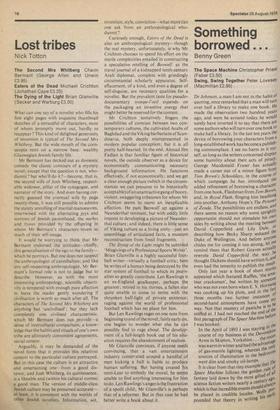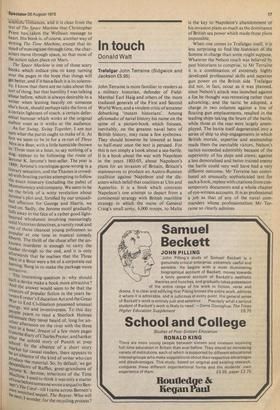Something
borrowed . . • Benny Green
The Space Machine Christopher Priest (Faber £3.50) Swing, Swing Together Peter LoveseY (Macmillan £2.95)
Dr Johnson, a man I am not in the habit of quoting, once remarked that a man will turn over half a library to make one book. He made the observation two hundred years ago, and were he around today he would surely have inverted it to say that there are some authors who will turn over one book to make half a library. In the last ten years the device of borrowing your characters from a long-established work has become a publishing commonplace. 1 see no harm in it rn)''' self, so long as the writers concerned displaY some humility about their acts of piracY• George Macdonald Fraser has actuallY made a career out of a minor figure froal Toni Brown's Schooldays. in the course of which campaign he has introduced the added refinement of borrowing a character from one book, Flashman from Tom Brown, and, in Royal Flash, flinging him headlong into another, Anthony Hope's The PriS011er of Zenda. The possibilities are endless, and there seems no reason why some sprightlY opportunist should not stimulate his own sales by writing about the meeting between David Copperfield and Lily Dale. °r describing how Becky Sharp seduced the Duke of Wellington. And before anyone chides me for coming it too strong, let nie remind them that Robert Graves actuallY rewrote David Copperfield the waY hje thought Dickens should have written it, anu even had the temerity to publish the result. Only last year a book of short stories appeared which featured Raffles, 'the arna" teur cracksman', but written by someonc who was not even born when E. V. Hornung. was cooking up his plots, and in the three months two further instances 0' second-hand atmospheres have come rrLY way. Not that mastery of pastiche is to .17. sniffed at. 1 had not reached the end of the re re paragraph of The Space Machine bef°r I was hooked:-n the In the April of 1893 I was staying course of my business at the Devonstm_ Arms in Skipton, Yorkshire. . . the roowe was warm in winter and had the advanrag of gas-mantle lighting, whereas the ortnilY_ sources of illumination in the bedroo s were dim and smoky oil-lamps.
Space Machine follows the golden rule„°11
It is clear from that tiny example t o, fantasy laid down by the most gifted ota; science fiction writers nearly a centurYiways which is that incredible events should a prO' lls
be placed in credible locales. we •ae rlY pounded that theory in writing his
scientific romances, and it is clear from the text of The Space Machine that Christopher Priest has. taken the Wellsian message to heart. His book is, of course, another way of writing The Time Machine, except that instead of moving just through time, the characters move through space, so that most of the action takes place on Mars.
The Space Machine is one of those scary books which induce you to keep turning Over the pages in the hope that things will .get better, and if it has a fault it is its solemnity. I know that there are no rules about this sort of thing, but that humility I was talking 'about before, which is always desirable in a Writer when leaning heavily on someone else's book, should perhaps take the form of a certain lightness of touch, a certain deferential humour which winks at the original author even as it winks at the audience. As for Swing, Swing Together, I am not sure what the purist ought to make of it. At first we seem to be in for a re-run of Three Men in a Boat, with a little homicide thrown in. Three men in a boat, to say nothing of a dog, appear to be following the route of Jerome K. Jerome's best-seller. The year is 1889: Jerome's travelogue-gone-wrong is a literary sensation, and the Thames is crowded with boating parties attempting to follow the exact itinerary (including the pubs) of Montmorency and company. We seem to be on the brink of a witty revelation about Jerome's plot and, fortified by our unqualified affection for George and Harris, we read on. Sadly, the Jerome motif gradually falls away in the face of a rather good lighthearted whodunnit involving reassuringly solid Victorian detectives, a varsity roué and °ne of those cleancut young policemen so P.opular at one time in musical comedy libretti The thrill of the chase after the unknown murderer is enough to carry the reader through to the end, and it is only afterwards that he realises that the Three herring, in a Boat were a bit of a corporate red herring, flung in to make the package more attractive.
The interesting question is: why should
3 a device make a book more attractive? And the answer would seem to be that the creators of popular fiction in the years between Forster's Education Act and the Great ._ar to End Civilisation possessed unusual 'ergy, wit and inventiveness. To this day 13"e „ople Yearn to read a Sherlock Holmes 'ut venture they never heard of, long for anOther afternoon on the river with the three nne n in a boat, dream of a few more pages from the diary of Charles Pooter,and hanker after the
school. untold story of Psmith at prep In the absence of a short story be
market for casual readers, there appears to 4n absence of the kind of writer who can duce the material. So, by default, we get vkcendants of Raffles, great-grandsons of Jeri, k. -rne K. Jerome, inheritors of the Time wlach' eftimine• I used to think it was only a matter e before someone wrote a sequel to Bennett ,s The. Card—till I came across Bennett's cri-I:vn Wretched sequel, The Regent. Who will next, I wonder, for the recycling process?



























 Previous page
Previous page